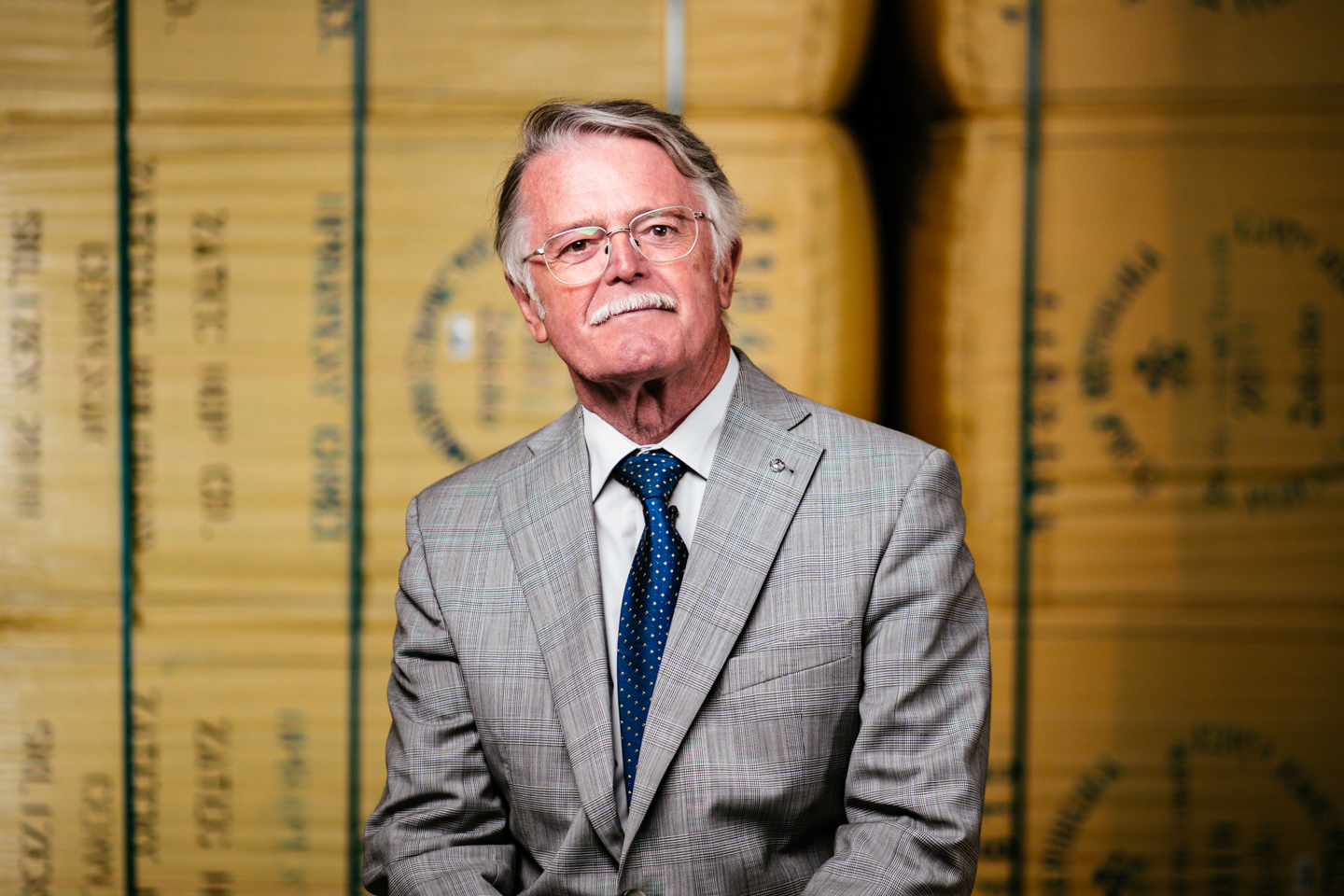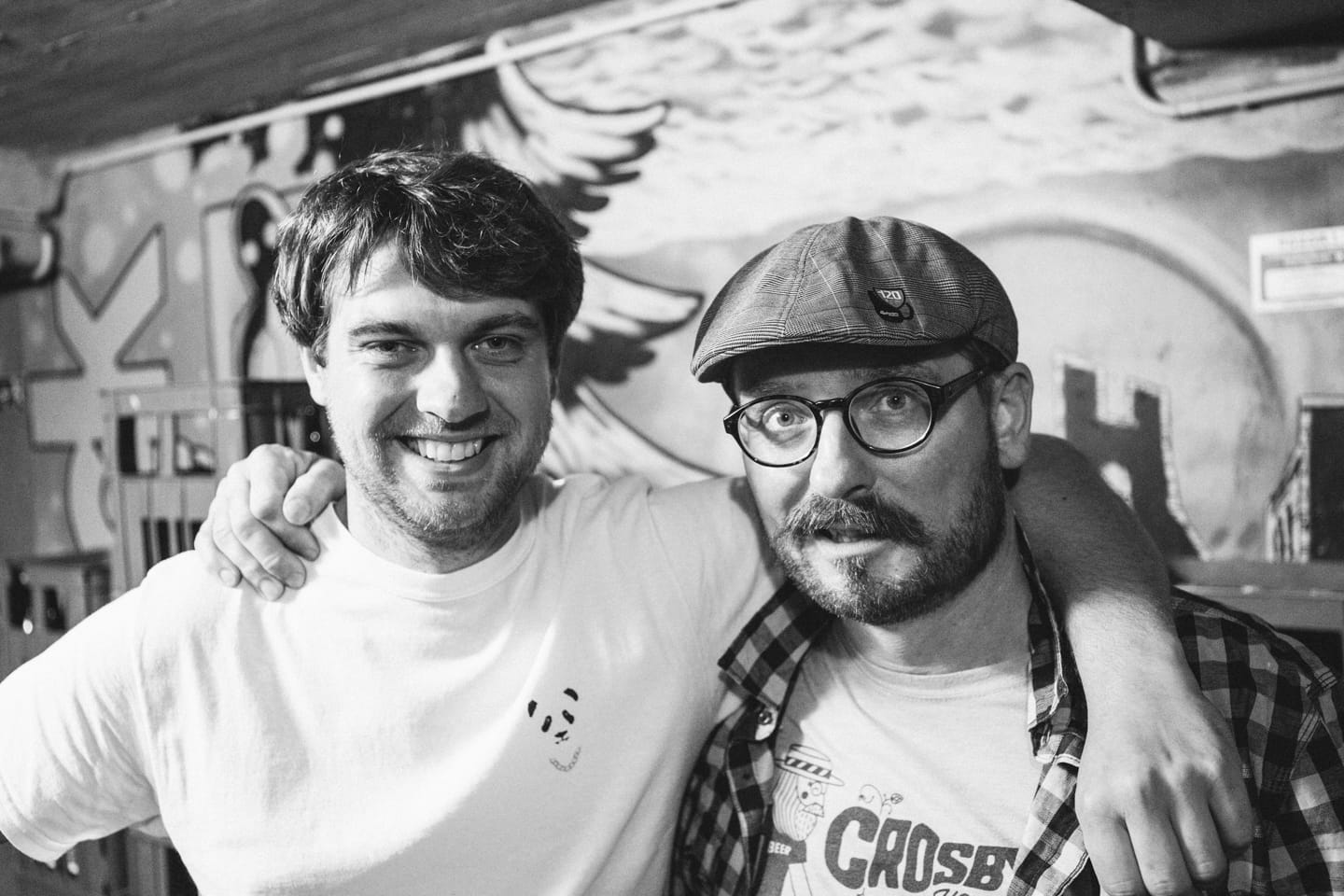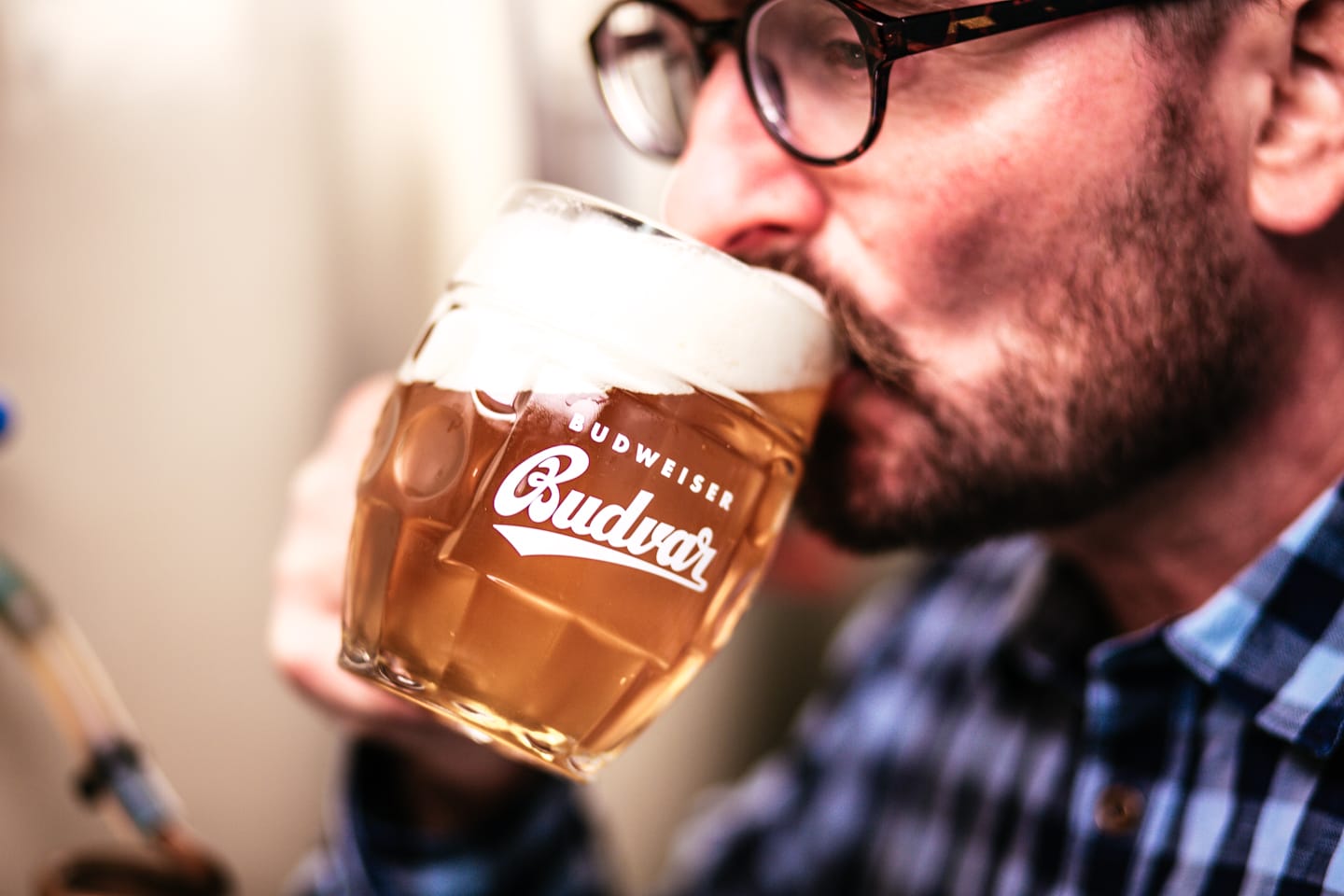SPIRIT
SINCE ITS FOUNDING IN 1895, THE STORY OF BUDWEISER BUDVAR HAS BEEN A STORY OF SPIRIT.
Josef Tolar is sitting on a bale of whole-cone hops, immaculately dressed in suit and tie, thinking about how best to explain something to me. Taking his time is a habit of the old Budweiser Budvar brewmaster. He considers all his words carefully, and likes to get things right. Exactly right. It’s the mindset you need if your job is creating the best Czech lager in the world for thirty years.
Then he looks at me. ‘I think I would put it like this…’ he says. ‘For the Czech people Budweiser Budvar is the family silver. It must never be sold. That’s the spirit here at the brewery…that spirit of independence.’
Josef stresses the word. And he’s right to. Not many breweries in the world are owned by a nation rather than a corporation, but since its founding in the town of České Budějovice a hundred and twenty-five years ago, Budweiser Budvar has remained in the hands of the Czech people. Today its ‘shareholders’ number 10 million of the most beer-obsessed people on the planet, so it’s perhaps no surprise that a little of the country’s spirit infuses the national brewery and its beer.
But what exactly is this spirit? How has the story of Budweiser Budvar been shaped and defined by it through history? And in what ways does the brewery keep this spirit alive today? That’s what I’ve come to this corner of South Bohemia, to find out.

“For the Czech people Budweiser Budvar is the family silver. It must never be sold. That’s the spirit here at the brewery…that spirit of independence.” Josef Tolar.
Distilling any national character into a word or two isn’t easy. Ask the locals here to define what Czech spirit is and you’ll likely get a list of different answers. But if the team at the brewery are anything to go by, they see themselves as playful, resourceful and pragmatic, ingenious yet with a strong sense of humour and hospitality. And a universal love of great beer goes without saying in a country that consumes more per person than anywhere else.
Other passions shine through too. Music, for example. I learn there’s an old Czech proverb that goes: every Czech is born, not with a silver spoon in his mouth, but with a violin under his pillow. And it’s not just Dvořák these days; Prague has one of the most buzzing Techno scenes in Europe. Likewise, there’s the nation’s long obsession with its countryside and outdoors, a love rekindled when the country was under Communist rule and venturing abroad wasn’t an option for most. To this day, Prague empties at weekends as its residents head for a hit of nearby greenery.
But the Czech spirit clearly runs deeper. A flick through the country’s history reveals many famous moments of defiance and resistance, with South Bohemia home to a particularly notable example. Half an hour up the road from the Budweiser Budvar brewery is the pretty hilltop town of Tábor. In its market square there’s a museum dedicated to Jan Žižka – a fourteenth-century tough-guy general and Czech national hero. His fame comes from his unmovable resoluteness and innovative military skill against enemies that were far superior in numbers and weaponry. Despite the overwhelming odds, Žižka trained and inspired his small army to resist the invading superpowers of Europe, beating them every time.
There are more peaceful examples too. Take the Velvet Revolution. In 1989, an uprising that began in Prague saw hundreds of thousands of Czechs on the streets, creating a wave of non-violent national protest that eventually brought about the end of the Communist era in the country, and led to the independent Czech Republic of today. So, resistance, defiance and a deep sense of the value of independence – all definitely make Czechs who they are. And as the national brewery, all are central to the Budweiser Budvar story too.
It’s something the current brewmaster, Adam Brož, knows well. “The very act of founding this brewery was an act of defiance,” he stressed earlier as I joined him to go through the enviable morning ritual of tasting a fresh batch of Budvar. “This was a Czech brewery, owned by Czech people, brewing beer for the Czech people.”
He’s referring to the moment in 1895 when a group of rebellious Czech brewers, fed up with being told what to do and how to brew, decided to break with their bosses and become masters of their own fate, setting up their own independent brewery in České Budějovice, or ‘Budweis’, as it was then known in the old German. It was a bold move, but it brought booming success. The quality and popularity of the beer from Budweis saw the brewery quickly facing demand from far beyond its borders. And not just in Europe. Soon this premium Budweiser beer was being exported all over the world, enhancing what was then the already 600-year-old brewing reputation of the town.
“The founding the Budweiser Budvar brewery was an act of defiance. This was a Czech brewery, owned by Czech people, brewing beer for the Czech people.” Adam Brož.
Even so, the Budvar brewery, much like the Czech nation, was to face many challenges in the years ahead. And it would need to draw on all its reserves and spirit to survive. War in Europe ravaged the Czech lands and, despite carrying on as it always had, the occupation of the brewery in 1942 effectively killed off its export industry overnight. It would be nearly half a century before production returned to pre-1939 levels. Even after peace was declared, and the Czech Republic was eventually able to shrug off the shadow of the Communist era, the brewery found itself battling new pressures of the open-market.
Trademark battles with the AB-InBev over the right to use ‘Budweiser’ in the name Budweiser Budvar have been ongoing since the early twentieth century. And just as long-running is the brewery’s refusal to roll over, an effort that has – at times – required Jan Žižka like levels of resolve and resistance. But in 1994, with the Czech Republic declared open for business, there were also renewed attempts to buy majority stakes and ownership of the brewery from investor groups and multinational companies. Again, Budweiser Budvar resisted every one, choosing to remain independent and owned by the Czech nation.
This was important because the 1990s also saw a huge change in global brewing production methods and the beginning of a decline in the use of more traditional ingredients, such as whole-cone hops. Budvar’s independence ensured its beer would remain brewed as it always had been, according to strict German ‘Reinheitsgebot’ or purity laws, meaning only malted barley, hops, yeast, and water could be used. Long before the craft beer scene and its independent ethos erupted, this refusal to sell out, compromise on quality or speed up the slow aging of the beer in the brewery cellars was winning a whole new generation of fans.
Pete Brown, a leading UK beer writer, was one of them.
“One thing I’ve always admired about Budvar is they’ve got this really ballsy, punchy spirit. They’ve been involved in quite a lot of David and Goliath style situations and they just come out swinging. And usually they win.” He told me in London. “I’d define their spirit as fiercely independent and obsessed with quality. Sometimes these are words you see used by brands, and it’s just a word on a marketing document. But with Budvar it’s a real spirit you can feel when you talk to people there.”
“I’d define the Budvar spirit as fiercely independent and obsessed with quality…it’s a real spirit you can feel when you talk to people there.” Pete Brown.
You can certainly say that again. We’re back to Josef Tolar in the hop room. That quiet defiance and resolve to get things right. And in a brewing world that’s changing fast, and not always for the better, perhaps that’s what being rebellious brewers, like their founding forefathers, means today. Maybe real revolution in 2020 is sticking to your principles and continuing to brew the right way, whatever the cost.
Certainly, Adam Brož believes so. I think back to something he mentioned earlier: “Staying independent and continuing to brew as we always have is how we honour our founding spirit.” He said. “It’s how we stay who we are.”
But as the national brewery, Budweiser Budvar also takes its responsibilities to the wider Czech beer culture seriously. The brewery supports its local communities of hop growers and barley farmers, as well as a wave of new craft breweries popping up across the country. There’s a deep connection and a sense of inspiration felt by many new Czech brewers, not just because of a shared independent spirit, but because Budvar remains owned by the nation.
I join Budvar’s beer sommelier, Aleš Dvořák, as he travels to the little village of Potštejn in the north-east of the country. We’re meeting the team at Pivovar Clock, an independent craft brewery, to discuss a new Budvar collaboration.

Jiří Andrš, co-founder at Clock has seen interest in craft beer increase dramatically in the country since he began the brewery in 2014. “Back then craft brewing in the Czech Republic was really small.” He says. “Now it’s maybe 400 or 500 breweries.” Also changing is the thirst for what used to be more foreign brewing styles. On their menu I find fresh American red IPAs, stouts, bitters and pale ales. A world away, you might think, from Budweiser Budvar’s obsessive dedication to consistency and its age-old brewing of premium Czech lager.
But, as Jiří and the Clock brewmaster Jakub point out, growing up in a country where beer was the national drink began their passion. The expertise, quality and spirit of Budweiser Budvar make it a fantastic institution to have in your corner, and a very deep well of knowledge to draw from. On cue, I leave Jakub and Ales to discuss the beer they’ll be making together, what ingredients and insight Budvar can help with, and head to the taproom.
“Budvar is our national brewery.” Jiří says, pouring me a beer. “It is owned by us, Czech people. So, one piece of Budvar is mine. We wanted to collaborate because they are a Czech brewery and we are a Czech brewery. And we are both independent. That’s a great match together.”
And there it is: the wish to brew great Czech beer, a sense of national ownership and that undying independent spirit. It’s how Budweiser Budvar’s story began a hundred and twenty five years ago, and it feels good to see that same spirit being passed on to, and kept alive by, a whole new generation of brewers today. Josef Tolar would be very proud.
“Budvar is our national brewery. It is owned by us, Czech people. So, one piece of Budvar is mine.” Jiří Andrš, Co-founder, Pivovar Clock.


